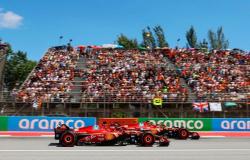In recent weeks the Russian media have spread, amidst many “ah”s and “ohs” of amazement, the news that in 2022, when the invasion of Ukraine began, sanctions began, the ruble began to slide ever more rapidly and the As the economy faltered, the Kremlin assigned her an escort and, in the offices where she works, had her set up an apartment complete with everything, including a sauna and gym, so that she could reduce travel and risks to a minimum. The reason? Elvira Nabiullina, governor of the Central Bank of Russia, had suddenly made the decision to raise the interest rate from 5 to 20% and there was fear that someone would make her pay. You didn’t bat an eyelid then and you didn’t even do so in recent days when, at the International Economic Forum in St. Petersburg, you told entrepreneurs that rates will remain high (we are now at 16%) as long as necessary. More than “whatever it takes”!
Because of the war we only talk about generals but the only character who is truly indispensable to Vladimir Putin it is she, the iron lady of the Russian economy. In fact, generals and ministers pass by, even at a certain speed, while she remains. Not a whisper about her, not a voice. Because Nabiullina is not up for discussion, period. Although everyone knows that at the beginning of the war you wanted to resign, disagreeing with the decision to invade Ukraine.
Elvira Sachipzadovna Nabiullina she is a small lady with big glasses, almost always dressed in black, born in Ufa (in Bashkiria) 60 years ago in the family of Tatar origins of a truck driver and a worker. She is the second woman to occupy the post of governor in the history of Russia. She and she was the only one in the G8 countries in 2013 when she was nominated. She graduated in Economics in Moscow at the age of 23, and at 34 she was already deputy minister of Economic Development and Trade. She stayed a year, then she went to work in the banking sector. She returned to the same offices as minister in 2007, a position she held for five years. In 2012, Putin wanted her at his side in the Kremlin as his first advisor on economic issues and the following year he sent her to the Central Bank. She has a top of the class face, let’s face it. But when she was younger she wore long hair and existentialist turtlenecks. She looked like an intern and was already hanging out with ministers and financiers.
Nabiullina married a famous economist, Yaroslav Kuzminovwho was his professor at the University, and has a son, VasilyHe is also an economist. In short, the family likes the economy. She, however, is not the prototype of the gray banker fanatic of numbers. She speaks English and French and is a great reader of poetry. The pins that she wears on every public occasion are also famous and have become the subject of study for analysts and stock market operators. It is a widespread belief (she was careful not to deny her) that her countless jewels send signals about the Central Bank’s next moves. Like: hawk brooch? Squeeze on interest rates. Some kind of blue wave? Reduction in rates and green light for credit. And so on.
Do you want to receive our newsletters?
Nabiullina must always be kept an eye on, for many reasons. The first is that she, also highly esteemed in the West (she was twice elected central banker of the year, Forbes has included her several times in the ranking of the hundred most powerful women in the world), is counted among those who, within of the narrow circle of people respected and listened to in the Kremlin, contested the decision to invade Ukraine. The video has become famous in which, in a summit meeting on 28 February 2022, Nabiullina listens to Putin without ever nodding or looking up from her papers. Two days later, the same banker made a very irregular “appeal to the nation”, warning the Russians that hard times were coming and that only solidarity would help them face the difficulties. Not quite a war proclamation, not quite a banker’s proclamation.
The second and truer reason, however, is that Elvira Nabiullina is Putin’s “cashier”, in the sense that she has her hands on the treasure which, perhaps, convinced Putin himself that the total challenge to the West was possible: those 643 billions of dollars in hard currencies and precious metals accumulated in the coffers of the Central Bank of Russia. It was Nabiullina herself who collected that money, in years and years of well-targeted monetary policy: low ruble to avoid an excess of expensive imports, strong earnings on exports (especially raw materials) paid in currency.
Many then accused her of having been an important part in the construction of that “fortress Russia” tending towards autarky which Putin relied on. However, the fact remains that the first title of “central banker of the year” was awarded to her in 2014 (and the second the following year), in the West, precisely due to the reaction implemented after the Russian reannexation of Crimea, when sanctions from the US and EU and the ruble lost half of its value, while the prices of gas and oil (which alone made up more than 50% of the Russian state’s revenues) slipped downwards. She burned 70 billion dollars to keep the ruble from collapsing completely, then let the exchange rate fluctuate but adopted an interest rate of 17.5%. And Russia, little by little, began to grow again.
Nobody in Russia would like to be in his place today. But there is no story, because no one could be in his place. Nobody has the experience of him. And in fact no one in Russia today is as important as her. Elvira knows it, even if she doesn’t show it. Last thing. After having worn almost only black sweaters and aggressive brooches for two years, Nabullina in St. Petersburg wore a light jacket and a blue brooch. Would you like to tell us something?
Fulvio Scaglione
Give us one more minute of your time!
If you liked the article you just read, ask yourself: if I hadn’t read it here, could I have read it elsewhere? If there was no InsideOver, how many wars forgotten by the media would remain so? How many reflections on the world around you couldn’t you do? We work every day to provide you with quality reports and insights completely free of charge. But the type of journalism we do is anything but “cheap”. If you think we are worth encouraging and supporting, do it now.





